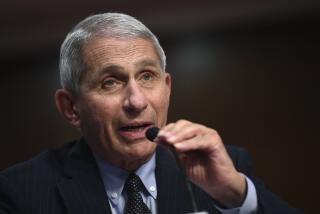Doctor Says Foster Attended Earlier Talk on Syphilis Test : Nominee: Former colleague denies that surgeon general-designate first learned of study in 1972. White House calls Georgian’s memory fuzzy.
- Share via
WASHINGTON — The physician who was president of the Macon County, Ala., Medical Society in 1969 insisted Tuesday that Surgeon General-designate Henry W. Foster Jr. was present at a meeting in which a controversial syphilis study was discussed and said that Foster expressed no opposition to the research at the time.
“I know he was there,” Dr. Luther C. McRae Jr. said in an interview. “He just looked up at the ceiling, leaned back in his chair and kind of rolled his eyes. It was clear he was dismayed by what he was hearing, but he voiced no objections.”
When questions first arose about the study last week, Foster denied any knowledge of it before 1972, when it was publicly revealed and condemned as a breach of medical ethics. He said that he shared feelings of outrage over the experiment, which deliberately denied medical treatment to a group of men suffering from syphilis so scientists could study the effects of the disease.
The White House disputed McRae’s recollections Tuesday, saying that his account is contradicted by the facts surrounding the May, 1969, meeting. Both sides acknowledge, however, that minutes of the session have either been lost or destroyed.
Allegations that Foster gave tacit approval to the now-condemned study are the latest in a series of questions being raised about Foster’s record and his veracity. Within hours of his nomination last month, he was forced to correct a statement that he had performed fewer than a dozen abortions over his 38 years as an obstetrician-gynecologist, acknowledging that the number was several times that. Shortly thereafter, critics challenged the practice, not uncommon in the early days of his career, of performing hysterectomies on mentally retarded women.
With the nomination in peril, the White House has waged an unusual campaign, arranging speaking engagements and other public appearances for Foster in an effort to win favorable votes when his nomination comes before the Senate.
The latest allegation, first circulated on Friday, provoked an angry response from Foster, who, in a speech Sunday to the First Baptist Church Capitol Hill accused “right-wing extremists” of attacking him. McRae gave his account of the meeting in a letter released on his behalf by the conservative American Life League.
In a subsequent interview, McRae said he was surprised at Foster’s denial and at his criticism of the study. “I said to myself: ‘Gosh, Hank, why are you raising so much hell now when you could have raised hell at that meeting in 1969?’ ” McRae said.
The syphilis study, sponsored by the Public Health Service, was begun in 1932 on 412 illiterate black men. Revelations of the study in 1972 were pivotal in establishing the concept of “informed consent,” which requires full disclosure to patients and research subjects of the risks and benefits of a treatment or experiment.
McRae now practices family medicine in Mt. Vernon, Ga. He said that he had supported Foster’s nomination but now has doubts.
“I thought he’d make an excellent surgeon general. But after this past weekend, when he didn’t face up to the truth, I question how, on the next go-around, whatever comes up, how valid his statements are going to be,” he said.
John Podesta, an assistant to President Clinton, said that when McRae was first interviewed, his recollections “on a number of points--ranging from how the May meeting was set up to the nature of the study to Dr. Foster’s role following the public disclosure of the study in 1972--(were) all inconsistent with the facts, as established by documentary evidence.”
Podesta said that the White House was “uncertain” of McRae’s motives for disputing Foster’s account. “But it’s not surprising that there’s some confusion and mixing of memories after 26 years.”
More to Read
Sign up for Essential California
The most important California stories and recommendations in your inbox every morning.
You may occasionally receive promotional content from the Los Angeles Times.










